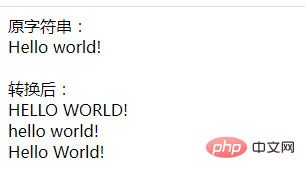How to convert all php strings to uppercase
Conversion methods: 1. Use strtoupper() function for conversion, syntax "strtoupper(string)"; 2. Use mb_strtoupper() function for conversion, syntax "mb_strtoupper(string, character encoding)" ;3. Use the mb_convert_case() function to convert, the syntax is "mb_convert_case(string, MB_CASE_UPPER, character encoding)".

The operating environment of this tutorial: windows7 system, PHP version 8.1, DELL G3 computer
In PHP, you want to convert a string into Convert all letters to lowercase, you can use the following 3 functions:
| Function name | Function |
|---|---|
| strtoupper | Converts all the characters in the string to uppercase |
| mb_strtoupper | Converts all the characters in the string to uppercase (similar to the strtoupper function There are differences) |
| mb_convert_case | Convert strings according to different modes |
Method 1: Use strtoupper() function for conversion
strtoupper() function can convert letters in the string to uppercase. The syntax format is as follows:
strtoupper($string)
Among them, $string is a parameter of string type. This function can convert the letters in the parameter $string to uppercase and return the converted string.
<?php
header("Content-type:text/html;charset=utf-8");
$str = "https://www.php.cn/";
echo "原字符串:<br> $str <br><br>";
$str = strtoupper($str);
echo "转换后:<br> $str";
?>
Method 2: Use mb_strtoupper() function for conversion
Function of mb_strtoupper() function Similar to the strtoupper() function, the letters in the string can also be converted to uppercase, and the mb_strtoupper() function can also set the character encoding of the parameter. The syntax format is as follows:
mb_strtoupper($str [, $encoding = mb_internal_encoding()])
where, $ str is the string that needs to be converted, and $encoding is an optional parameter used to set the character encoding of the parameter.
The difference from the strtoupper() function is that the letters in $str are determined through the Unicode character attribute. Therefore, the mb_strtoupper() function is not affected by the locale setting and can convert any character with a "letter" attribute, such as a umlaut (ä).
Example 1:
<?php header('content-type:text/html;charset=utf-8'); $str = "hello"; echo "原字符串:<br> $str <br><br>"; $str = mb_strtoupper($str, 'UTF-8'); echo "转换后:<br> $str"; ?>

Example 2:
<?php
header("Content-type:text/html;charset=utf-8");
$str = "τάχιστη αλώπηξ βαφήσ ψημένη γη, δρασκελίζει υπέρ νωθρού κυνόσ";
echo "原字符串:<br> $str <br><br>";
$str = mb_strtoupper($str, 'UTF-8');
echo "转换后:<br> $str";
?>
Method 3: Use the mb_convert_case() function to convert
The mb_convert_case() function can convert strings from upper to lower case. The syntax format is as follows :
mb_convert_case($str, $mode [, $encoding = mb_internal_encoding()])
Among them, $str is the string that needs to be converted; $mode is the conversion mode, which can be MB_CASE_UPPER (all converted to uppercase), MB_CASE_LOWER (all One of MB_CASE_TITLE (convert the first letter to uppercase); $encoding is the character encoding of the parameter and can be omitted.
Compared with the strtolower() and strtoupper() functions, the mb_convert_case() function performs case conversion based on Unicode character attributes. Therefore, the behavior of the mb_convert_case() function is not affected by the locale setting and can convert any character with a "letter" attribute, such as the umlaut A (Ä).
<?php
header("Content-type:text/html;charset=utf-8");
$str = 'Hello world!';
echo "原字符串:<br> $str <br><br>";
echo "转换后:<br>";
$str = mb_convert_case($str, MB_CASE_UPPER, "UTF-8");
echo $str.'<br>';
$str = mb_convert_case($str, MB_CASE_LOWER, "UTF-8");
echo $str.'<br>';
$str = mb_convert_case($str, MB_CASE_TITLE, "UTF-8");
echo $str.'<br>';
?>
Recommended learning: "PHP Video Tutorial"
The above is the detailed content of How to convert all php strings to uppercase. For more information, please follow other related articles on the PHP Chinese website!

Hot AI Tools

Undresser.AI Undress
AI-powered app for creating realistic nude photos

AI Clothes Remover
Online AI tool for removing clothes from photos.

Undress AI Tool
Undress images for free

Clothoff.io
AI clothes remover

Video Face Swap
Swap faces in any video effortlessly with our completely free AI face swap tool!

Hot Article

Hot Tools

Notepad++7.3.1
Easy-to-use and free code editor

SublimeText3 Chinese version
Chinese version, very easy to use

Zend Studio 13.0.1
Powerful PHP integrated development environment

Dreamweaver CS6
Visual web development tools

SublimeText3 Mac version
God-level code editing software (SublimeText3)

Hot Topics
 1667
1667
 14
14
 1426
1426
 52
52
 1328
1328
 25
25
 1273
1273
 29
29
 1255
1255
 24
24
 PHP: A Key Language for Web Development
Apr 13, 2025 am 12:08 AM
PHP: A Key Language for Web Development
Apr 13, 2025 am 12:08 AM
PHP is a scripting language widely used on the server side, especially suitable for web development. 1.PHP can embed HTML, process HTTP requests and responses, and supports a variety of databases. 2.PHP is used to generate dynamic web content, process form data, access databases, etc., with strong community support and open source resources. 3. PHP is an interpreted language, and the execution process includes lexical analysis, grammatical analysis, compilation and execution. 4.PHP can be combined with MySQL for advanced applications such as user registration systems. 5. When debugging PHP, you can use functions such as error_reporting() and var_dump(). 6. Optimize PHP code to use caching mechanisms, optimize database queries and use built-in functions. 7
 PHP and Python: Comparing Two Popular Programming Languages
Apr 14, 2025 am 12:13 AM
PHP and Python: Comparing Two Popular Programming Languages
Apr 14, 2025 am 12:13 AM
PHP and Python each have their own advantages, and choose according to project requirements. 1.PHP is suitable for web development, especially for rapid development and maintenance of websites. 2. Python is suitable for data science, machine learning and artificial intelligence, with concise syntax and suitable for beginners.
 PHP vs. Python: Understanding the Differences
Apr 11, 2025 am 12:15 AM
PHP vs. Python: Understanding the Differences
Apr 11, 2025 am 12:15 AM
PHP and Python each have their own advantages, and the choice should be based on project requirements. 1.PHP is suitable for web development, with simple syntax and high execution efficiency. 2. Python is suitable for data science and machine learning, with concise syntax and rich libraries.
 PHP in Action: Real-World Examples and Applications
Apr 14, 2025 am 12:19 AM
PHP in Action: Real-World Examples and Applications
Apr 14, 2025 am 12:19 AM
PHP is widely used in e-commerce, content management systems and API development. 1) E-commerce: used for shopping cart function and payment processing. 2) Content management system: used for dynamic content generation and user management. 3) API development: used for RESTful API development and API security. Through performance optimization and best practices, the efficiency and maintainability of PHP applications are improved.
 The Enduring Relevance of PHP: Is It Still Alive?
Apr 14, 2025 am 12:12 AM
The Enduring Relevance of PHP: Is It Still Alive?
Apr 14, 2025 am 12:12 AM
PHP is still dynamic and still occupies an important position in the field of modern programming. 1) PHP's simplicity and powerful community support make it widely used in web development; 2) Its flexibility and stability make it outstanding in handling web forms, database operations and file processing; 3) PHP is constantly evolving and optimizing, suitable for beginners and experienced developers.
 PHP vs. Other Languages: A Comparison
Apr 13, 2025 am 12:19 AM
PHP vs. Other Languages: A Comparison
Apr 13, 2025 am 12:19 AM
PHP is suitable for web development, especially in rapid development and processing dynamic content, but is not good at data science and enterprise-level applications. Compared with Python, PHP has more advantages in web development, but is not as good as Python in the field of data science; compared with Java, PHP performs worse in enterprise-level applications, but is more flexible in web development; compared with JavaScript, PHP is more concise in back-end development, but is not as good as JavaScript in front-end development.
 PHP and Python: Different Paradigms Explained
Apr 18, 2025 am 12:26 AM
PHP and Python: Different Paradigms Explained
Apr 18, 2025 am 12:26 AM
PHP is mainly procedural programming, but also supports object-oriented programming (OOP); Python supports a variety of paradigms, including OOP, functional and procedural programming. PHP is suitable for web development, and Python is suitable for a variety of applications such as data analysis and machine learning.
 PHP and Python: Code Examples and Comparison
Apr 15, 2025 am 12:07 AM
PHP and Python: Code Examples and Comparison
Apr 15, 2025 am 12:07 AM
PHP and Python have their own advantages and disadvantages, and the choice depends on project needs and personal preferences. 1.PHP is suitable for rapid development and maintenance of large-scale web applications. 2. Python dominates the field of data science and machine learning.




